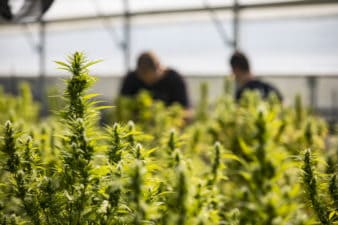Colombia, a nation long associated with cocaine production, drug trafficking, and narco-violence, is endeavouring to become a leading global producer of legal cannabis. The 2015 introduction of legislation legalizing the production and sale of medical marijuana has sparked a veritable green rush, as companies push to take advantage of the equatorial nation’s considerable advantages when it comes to agricultural production.
It also sparked considerable hyperbole about the potential held by Colombia to become a leading global cultivator because of its climate, rich volcanic soils, and low operating costs. Despite these advantages, it appears that Colombia’s legal cannabis industry is overhyped, and the nascent boom could end abruptly.
Busting myths
A misleading assertion is that Colombia has been awarded an official quota to supply 44%, or 40.5 tonnes, of the world’s legal medical marijuana needs. Its fledgling legal cannabis industry is simply incapable of producing that volume for what is essentially a theoretical quota awarded by the International Narcotics Control Board (INCB). The INCB is a UN entity responsible for monitoring and supporting government compliance with international drug treaties. It has essentially no enforcement powers nor coercive capabilities regarding the conduct of sovereign states, meaning that any quotas awarded have little material relevance.
The lack of productive capacity and commercial scale are important concerns. While over 100 licences have been issued since legalization, by May 2019, only a handful of cultivators were fully registered with the Colombian Agricultural Institute. This is a lengthy and difficult process, which aims to prove the genetic origination of seeds and quality of the cannabis being cultivated. If it not completed, licensed growers are unable to commence commercial cultivation. That alone will delay the production of large commercial cannabis crops with no grower having produced such a crop to date.
Export restrictions are another serious constraint. Colombia’s government doesn’t permit the export of dried flower, only cannabis oil. This strict stance can in part be attributed to the long history of narco-trafficking in the South American nation, which has been responsible for funding the decades-long civil conflict and sees it as the leading source for much of the cocaine and marijuana consumed in developed nations.
Poor access to capital is also a significant concern, preventing Colombia’s legal marijuana industry from flourishing. Financial institutions are extremely reluctant to provide funding for cannabis start-ups, because of the association of marijuana with the organized crime, illegal armed groups, terrorism, and extreme violence. This is exacerbated by marijuana remaining classified as a schedule one substance by the U.S. federal government. The fear is that any institution that provides funding to Colombian cannabis start-ups could find itself on the wrong side of transnational money-laundering investigations and sanctions.
Leading Canadian cultivator Canopy Growth (TSX:WEED)(NYSE:CGC) has acquired 13.6 million square feet of licensed cultivating area in Colombia and established a manufacturing agreement with Colombian pharmaceutical company Procaps, Canopy has stated that while this provides it with an ideal opportunity to meet growing regional demand, it is only using a portion of the cultivation area and will ramp up operations as market demand dictates. It appears that Canopy is building its outdoor growing operations in Saskatchewan, where it acquired a licensed property and has planted seven million square feet of cannabis cuttings.
What does the future hold?
A maze of laws, multiple regulators, and now a plan to change some of those laws are further aggravating these issues. President Duque is also pushing to re-criminalize the social consumption of marijuana, which will likely nix an initiative before congress that aims to make recreational use fully legal.
It is difficult to see Colombia’s cannabis boom progressing as claimed, unless regulations are relaxed and access to capital is improved. To sidestep those hurdles, Colombian start-ups have been using the model pioneered by Canadian oil companies, where operations were established in Colombia and capital raised on the Toronto Stock Exchange. Even this is proving incapable of overcoming the issues weighing on the industry.







